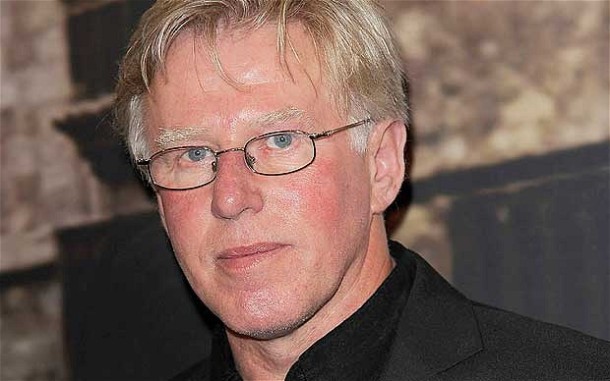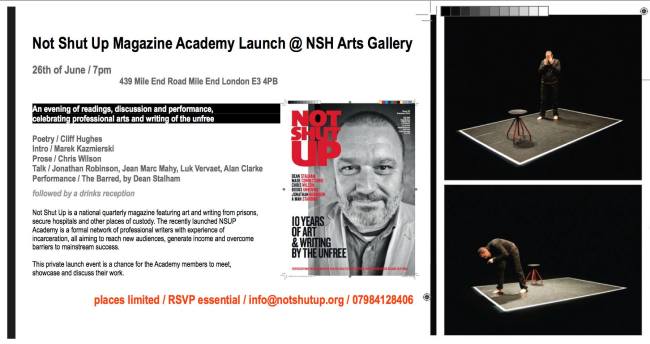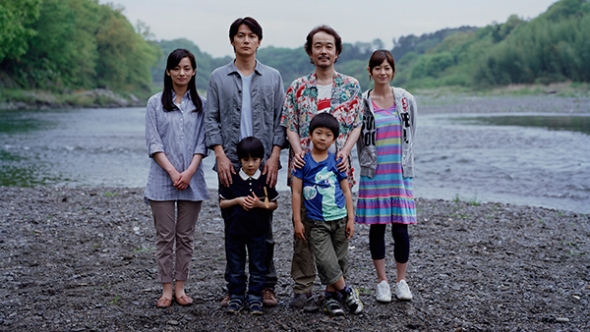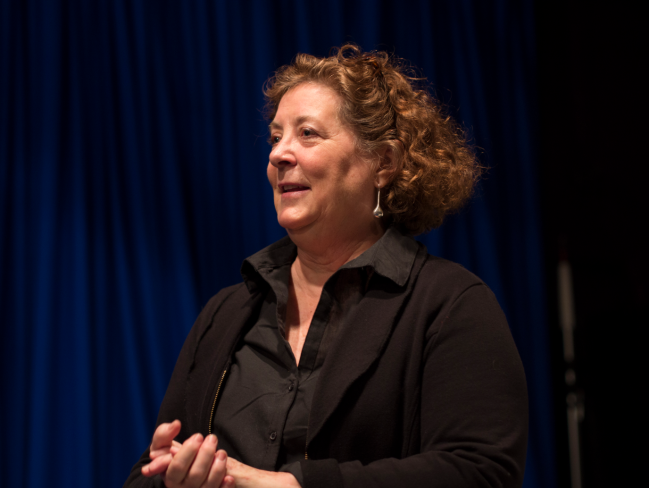
East end actor Phil Davis notoriously gives few interviews, however, during his visit to the campus at University Square Stratford he treated UEL Film and Theatre students to a private Q&A. Friendly, open and humble, there wasn’t a trace of his trades-mark guardedness, as he let us in on his experiences as an actor, writer and director, for both the stage and screen.
March 2014
Edited by Emma Burles
UEL. What is your way in to the character when you first get the script?
PD. It varies, sometimes you have the script and you instantly know what the character is like, sometimes it’s more difficult and you just have to be patient, you have to wait until you get there. I know people who do a great deal of preparation and their script is covered with stuff – they’re going to move on this line and they’re going to say that line in this way and so on. But of course they get there on the day and everything’s different to how they planned, you know, it’s raining and they thought it was going to be sunny, the director wants them to sit down and they were going to pace about…so I don’t work out in advance how I’m going to play it, instead I work out in advance who he is. What he’s had for breakfast, what his relationship with his wife is like, do his kids piss him off? You bring all of those things into it, and then you just let it happen for the first time. And that’s the essence, that’s the key to film acting, it happens organically. Once you’ve committed yourself to a way of doing it, you try to stick to it but you don’t make all these decisions in your head intellectually, because when you stand the character up something else happens, and you have to go with that, it’s an instinctive thing. The golden rule for me is to always feel like the character is someone very separate to myself. I always feel like I’m painting a portrait – a portrait that I’m embodying. And it’s liberating, it makes it easier to get away with things.
UEL. When you arrive on a film set and it wasn’t rehearsed beforehand, what’s your basis for the character, do you get three or four character traits and then play it with those or is it just out of the moment?
PD. It’s out of the moment…I mean, it depends what you’re going to do in the scene. If it’s a scene where you’re hiding or something, then you just hide, you just do it naturally and instinctively. I mean I don’t sort of tick off “Oh, he moves like this, or he’s got a twitch”, it’s not like that. Sometimes I don’t know what he’s going to do at all, until I get there, and then I just do what seems natural and right. Also you’re restricted, you’ve got a set and a camera and 500 people dangled at your every word, and you’re being told not to go too far to the left and so on. So there is all of that going on, and you just have to try to stay relaxed and think to yourself, “if this goes wrong, I can do it again.”
UEL. Have you ever got there with a clear idea of what your character is going to be like and your vision is not the same as the directors?
PD. Yes and it’s difficult. Over the years I’ve developed certain strategies and ways around this, but it’s difficult. As an actor you have a responsibility to do the thing in a way that makes the film, or the play, or the story work. I mean there is nothing worse then an actor coming in and doing a wonderful performance that belongs in a different play. But it is a difficult thing when the director has this vision that is completely outside of what it was you wanted to do. But it doesn’t happen often. When someone hires me, they’ve usually hired me to do it my way so they just let me play it, but there are sometimes directors who are over prescriptive. They’re usually the ones who want you to audition first, they want to discuss how you’re going do it and they’re usually not very experienced.
UEL. What kind of actors do you like working with, whether it be in film, television or theatre? What are you looking for from your fellow actors in a scene?
PD. What you get is what you get. I mean when I’m acting with someone, I never ever, ever suggest that they play it differently, even if it’s completely not what I was expecting. Film acting is as much about reacting as it is about acting, you can come in with all these decisions about how you’re going to do it but if someone suddenly starts shouting at you then you’ve got to react to that! The main difficulty is when you are faced with an actor who won’t commit to a way of playing it, who keeps changing their mind, because then the people playing opposite don’t know how to play against them. The type of actors I liked working with when I was directing were the ones who would take responsibility for themselves. They would grab their role and commit to it and then as a director you just have to find a way of capturing the very best of them. The director is not there to tell actors how to do things, they’re there to draw the strings and to make sure everybody is making the same film.
UEL. What other kinds of things do you look for in a director?
PD. I remember working with Howard Davies who directed Philistines [2007]. He was wonderful because he was so attentive. If you did anything even remotely different he would immediately notice it and either encourage or discourage it. And then some years ago I acted in a short film in Seattle and it was an absolute joke. They did the first rehearsal and when it came to filming, someone said “Action!” and they all looked straight down at their scripts! No one was watching us, no one was actually looking at the event they were filming and looking for things that could be done differently. Something else I learnt as a director was, once you have all the actors in a room and they are asking for you to instruct them, it’s good to just ask them to do what comes naturally, and then work out how to shoot it. Let the actors have their head to start with, which gives you something to work with, your raw material that you can then start to mold. That’s my best advice to a director, don’t be too prescriptive, especially at the beginning.
UEL. Have any of the characters you’ve played had an influence on you or your life?
PD. Some have. I did a film called High Hopes [1988, Mike Leigh, UK] and played a character called Cyril, who was a disillusioned left-winger at the time when Thatcher was in power. I liked him and empathized with the things he was struggling with, such as bringing children into such a world and so on. Another was Stanley Drake in Vera Drake [2004, Mike Leigh, UK]. I liked Stanley, he always reminded me a bit of my father. He was a good, loyal and unambitious man. These were characters that were invented over a period of months; we weren’t just handed a script on the day and told to get on with it. We knew their stories from childhood. With Stanley I went through the war with him, I had this whole lifetime’s experience of this man, I knew he was orphaned when he was 12 and was one year too old to go into an orphanage so had to go out on his own. This was all properly researched, what would have happened to a kid like that in those days, working around Islington on the markets and living in lodging houses. So I had a great deal of respect for the man and I was sorry to let him go. I remember shaving the moustache off and it was like saying goodbye to an old friend!
UEL. Going back to auditions, so you probably don’t have to audition anymore…
PD. No, I still have to audition, not often but sometimes directors want to meet you to see if you’re an amiable bloke and to see if you can get along with them. And if the part is a mold-breaker, if I’m doing an accent I haven’t done before, or if I’m slightly too young or too old for a part, they just want to see if you’re convincing. And sometimes if you’re working with an actor who’s a bigger star than you, they might want to check you out and see if you can do it! But I don’t have an audition technique, I just sort of breeze in, and try to relax and be myself.
UEL. Do you find it helpful to write down lists of questions down about your character?
PD. No, I very rarely write anything down. When I worked with Mike Leigh, we would do lots of research into our character, what’s the name of their second cousin, where did you go to school, etc. and he would never let you write any of it down; he would write it down, but we couldn’t. And it’s really interesting because you’ve got a list of school friends in your head, and you’re doing improvisational scenes playing a character who’s 50 and you think, “What was that bloke’s name again?”, you can’t remember it and that’s how it should be! So as an actor it’s best not to write things down, or cover your script in notes.
UEL. I guess that keeps it brewing too?
PD. Yeah, it keeps it brewing, and the process will change, and the things you think are going to be important when you start working on a character sometimes drop away and become trivial.
UEL. Would you ever go back and say, “no that didn’t happen” as far as an event in a characters background goes?
PD. Working with Mike Leigh, with improvisations, you’d make mistakes and you’d always have a little post-mortem, and you might say, “actually no, he wouldn’t have said that, that was a mistake”, and you rub it out of history, then you go back to the other character and say, “you know when he said that? Well, he didn’t” [laughter] With a character’s back-story, nothing’s set in stone.
UEL. Would you change something quite late in the game?
PD. Well its not unprecedented. I’ve known other actors to do it, to say “I want to play this differently” and I just tell them to do what they want and then respond to what I’m getting. I remember doing a scene in a film I was directing and I had an idea that this girl was very emotional and it should all burst out and she should sob, and we got there on the day and she couldn’t sob. I tried to encourage her and she couldn’t get it out. And that was actually right because when we put the camera on her, it looked like she was trying desperately not to cry, which went better with the story, when in fact she was trying desperately to cry! Sometimes, what you think you’re going to get is not what you get, but what you do get is better.
UEL. You’ve talked a lot about how you’ve made lots of strong choices and commitments about what you’re going to do with the character. Do you also make a lot of strong choices at the beginning about what you think about the other characters in the scene?
PD. Yeah, you know, this is interesting, because it’s a different thing working in the theatre where you’ve rehearsed it, you’ve seen what somebody’s doing and you’ve seen it grow over a period of weeks, until finally you reach a kind of accommodation with each other about how the thing is going to be played. Quite often on the screen though, you haven’t rehearsed it and if you’ve got a long scene, like my scene in Sherlock, it can be a thrilling process. Benedict [Cumberbatch] and I hadn’t rehearsed anything, and we we were sitting across this desk from each other, and we had no idea how each other was going to play it, or what the pace was going to be like. It was like two musicians jamming. There was this big element of extemporization, you rehearse it once so everyone can see it and then they put a camera on it and you’re off. It was slightly different every time and that was the joy of it, that it didn’t have to be exactly the same. I mean there were some technical things, you have to put the cup down in the same place or stand up in the same way but within that, there were bits when we were slightly more amused with each other than we had been before and bits when he was slightly more appalled by me then he had been before, and every time something different happens you respond to it and that’s tremendously exciting. The business of filmmaking is that you do it as if for the first time and sometimes you surprise yourself at what is coming out of you and it’s fantastic. When that happens it’s proper acting, you feel like a proper artist. It doesn’t happen all the time, sometimes you’ve got your gumboots on and you’re wading through the mud; but when it does it is wonderful, you go home and you feel like you’ve done a good day’s work.
UEL. Would you say you are freer at this stage in your career?
PD. I think so yes, I’m more daring now, I’m happier to hold my nose and jump than I was when I was younger. I’m not scared anymore; I don’t care about making a fool of myself. I don’t care about getting it wrong and I think I’m as good as I’ve ever been. Sometimes when you’re young you can be a little more daring with your choices as you’re doing things for the first time. But there are only so many characters you can play, and one of the things about getting older is that the range of characters I get offered now is wider than it was when I was younger. I was very much in a sort of groove playing these characters that were very similar, whereas now I’ve got a wider range and that’s very pleasing. I love it when I get sent a script and I read it and I think “blimey, whatever made them think of me for this” and that’s really thrilling because you feel like you’re breaking the mold and perhaps doing something that you haven’t ever done before.
UEL. And is there any particular actor or actress that you admire?
PD. I wanted to be an actor from when I was 8 or 9 years old living on a council estate in Essex. My dad worked in a soap factory and we were just an ordinary family, but I got it into my head somehow that I was going to be an actor. Of course there were actors who I’d seen and thought were great but it wasn’t about that, it was about what happened to me when I did it. I remember in primary school being asked to read this story out loud. It was a story set in a market place with lots of characters, I read it and 10 minutes went past in a flash, I think he only wanted me to read a couple of pages [laughter], but I was like a steam train, he couldn’t stop me! It was like I was transported. I knew something had happened to me and the teacher said to my mum at a parent-teacher meeting “he’s a born actor” and that sort of stuck in my head. Another thing that spurred me on was the idea that you could do this for a living. My old man, bless his heart, went off on his bike every morning to work in a factory, and it was a good job, and he looked after his family but it wasn’t what I wanted to do with my life. The idea that you could do this thing that you really liked more than anything else and get paid for it sort of set me off. So I never had heroes as such, and I think in a way it can be counterproductive, you need to be able to work alongside anyone you get asked to and you have to feel like you belong there. You need to be able to play the same scene just as well with Robert De Niro as with some bloke off the street.
UEL. I imagine in those days, coming from a working class environment, that becoming an actor was probably something quite alien. Were you supported much at school and amongst your peers and family?
PD. It was difficult, I mean I was like that kid who wanted to become a footballer, you know, people waited for me to grow out of it. My parents were very supportive, my mum especially so. But it was completely outside of their experience, they could do nothing to help, except just let me go and not tell me it wasn’t possible. I think my dad was always worried that I was going to end up massively disappointed and it took him a long time to realize that I was going to be alright. I didn’t have a great deal of support at school, I remember the careers master coming, and I said I wanted be an actor and he just rolled his eyes. I was a difficult kid because of it, I wanted to run away from my family home and get out of this place and I felt a lot of guilt about that. All my mate’s dads worked in Ford’s factories and they were expected to follow their footsteps – and there is nothing wrong with that – but it’s not what I wanted to do. So it seemed like a bit of a ridiculous dream for a long time but it also meant that when I did get even a sniff of an opportunity I was going to grab that bastard with both hands and not let go. When someone gave me a chance I was there on time and I worked hard.
UEL. Your wife is also a successful actress [Eve Matheson (Darling Buds of May)]. How does it work at home, do you discuss work and give each other advice?
PD. We hardly ever talk work, we never work together, and it only comes up in terms of organizing schedules. She’s 53 now, and it’s very, very difficult for a woman of that age to keep their career going, which is such a terrible injustice because there are so many brilliant actresses of that age – it’s much tougher for women than for men. But yeah, we have a healthy relationship and put all of that to one side.
UEL. Did you ever do any other jobs in your early career?
PD. For about a year I had a period with very little acting work, and I did a few different things – a messenger boy in the city; a sports journalist for the East London Post. But I’ve been very fortunate in that I’ve nearly always managed to get work. People ask me when my big break was but I’ve never really had one, I’ve just managed to keep going. Longevity is the most important thing.
UEL. Do you watch your stuff, and are you very critical of yourself when you do?
PD. No, I don’t watch things over and over – that way madness lies. Once I’ve done it, I’ll watch it maybe once, but then I let it go. Once it’s been shot it’s shot. I listen to other people, if someone wants to criticize something I’ve done, I’m perfectly willing to listen. But I don’t pick over the bones of it.
UEL. Do you have any advice for avoiding sitting and waiting by the phone?
PD. Yes, generate your own work. Find a space somewhere, find some likeminded souls, get a play from somewhere, find one you love, adapt a novel, just do something. I wrote a play in 1989, and I put it on at the Old Red Lion, because I got fed up with waiting. I had a couple of theatres saying “oh you know, its quite good” and all that but I didn’t want to wait around for 18 months so I did it myself. I found a cast, I found a set designer, we painted the theatre because we couldn’t afford a set and I had to raise some money from friends. I’d actually just done a television series so I knew some people who were flush [laughter]. Obviously it’s got to be good and you’ve got to approach it as you would do the Royal Shakespeare Company. But that play of mine did really well and that then became a film, my first film as a director, Skullduggery [1989, UK]. So that’s how it works when you start out, by actually generating your own material. Because nobody is going to give you an even break. For every assistant director assisting someone, there are 200 people who didn’t get the gig. But this process is how different styles of theatre get generated – from people who have something new to add. And that is the most important piece of advice I can give you – don’t sit around waiting to be invited in to this exclusive world, make your own world, make your own theatre.











